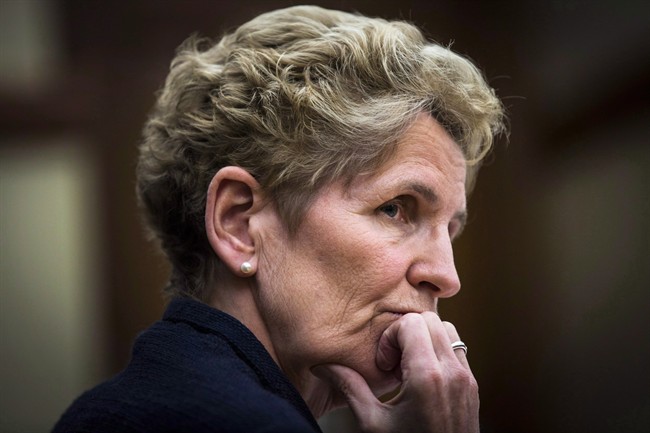TORONTO – A union representing Ontario civil servants says Premier Kathleen Wynne is picking a fight by forcing workers to pay more for retirement benefits.

The government announced the changes late Tuesday, which will also require civil servants to work longer to qualify for retirement benefits.
Warren “Smokey” Thomas says the changes came out of the blue and he’s seeking legal advice on whether the government can make them unilaterally.
They won’t apply to current retirees, but Thomas says it will punish future workers and those who don’t retire before 2017 when the changes kick in.
He says the Ontario Public Service Employees Union has negotiated changes in the past and is willing to do so again.
Thomas says he’s asking Wynne to rescind the changes and stop attacking the middle class for political reasons, like balancing the budget in 2017-18.
Wynne consults with everybody in the province except labour, and then she calls us labour partners, he said.
Thomas said when he met Wynne after she became premier a year ago, she told him the government had no money.
“I said, ‘I’ve got two words for you sister: every time you say we’ve got no money, I’m going to say power plants.”‘
- Alberta to overhaul municipal rules to include sweeping new powers, municipal political parties
- Grocery code: How Ottawa has tried to get Loblaw, Walmart on board
- Military judges don’t have divided loyalties, Canada’s top court rules
- Norad looking to NATO to help detect threats over the Arctic, chief says
The Liberals have been under fire for pulling the plug on two unpopular gas plants ahead of the 2011 election – one just days before voters were to go to the polls – which the auditor general says could cost taxpayers up to $1.1 billion.
The government said the retirement benefit changes they’re planning will save them $1.2 billion over five years.
Public-sector employees retiring in 2017 and later will have to pay half of their benefits premiums for life, health, dental and vision coverage, which is currently covered by the province, it said.
It also plans to change the eligibility period for retiree benefits from 10 to 20 years for workers who are hired from Jan. 1, 2017 onward or who have less than a decade of pension credit by that time.
Thomas said the average pensioner in the public service receives $20,000 a year and future retirees will take a big hit if the government goes ahead with the changes.



Comments